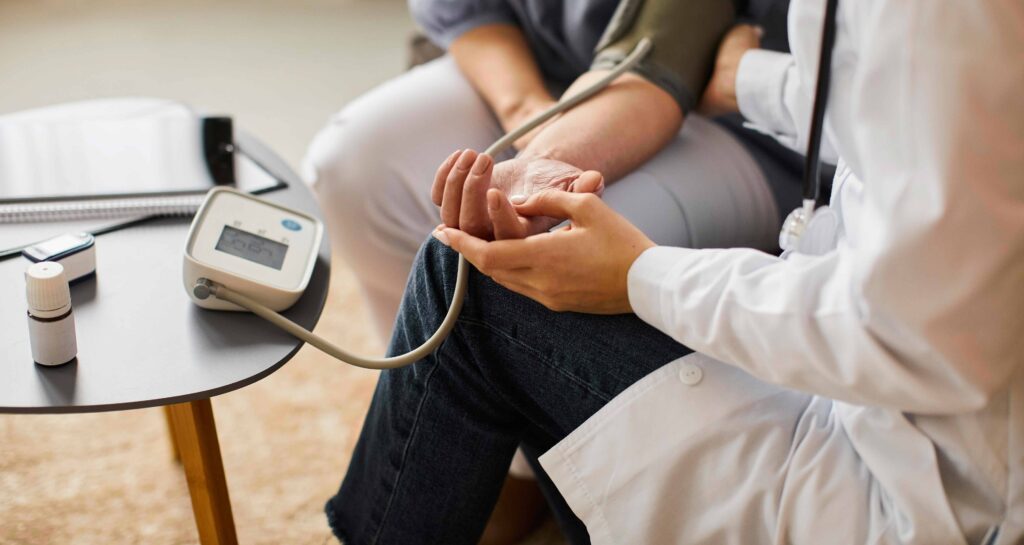Dehydration is a condition when the body doesn’t have enough fluids. Losing fluids faster than you can replace them and not drinking enough fluids both result in dehydration.
Untreated dehydration can be very serious or it can lead to life-threatening issues such as fluctuations in blood pressure which further can cause kidney problems and heart-related issues.
Our experts at Texas Specialty Clinic will assist with the best treatment for blood pressure fluctuations. Connect with our specialists at (469) 545-9983.
How does dehydration affect blood pressure?
Blood pressure can be defined as the force of blood exerts on the walls of arteries and veins. Dehydration can affect the blood pressure, by spiking up or going down.

Relation between dehydration and low blood pressure
Dehydration causes low blood pressure by decreasing blood volume. Blood pressure is considered as low when its reading is below 90/60mm. Blood volume can be defined as the amount of fluid circulation in the blood vessels. Maintaining a normal blood volume is necessary for blood to work properly and reach all of the tissues.
When someone is very dehydrated, their blood volume can decrease, hence blood pressure also decreases. When blood pressure drops too low, the proper flow of oxygen and nutrients to the organs is hindered. So the person can face shock or stroke issues.
Relation between dehydration and high blood pressure
Dehydration can increase the secretion of vasopressin hormone in the body due to which blood pressure also increases and thus high blood pressure problems occur. Blood pressure is considered as high when its reading is above 120/80mm.
Vasopressin hormone is secreted when there is a high amount of sodium level in the blood or blood volume is extremely low. These conditions come when fluid in the body is very low. In response, when anyone is dehydrated, the kidneys reabsorb the urine water. High concentrations of vasopressin also cause constriction in blood vessels.
Some other symptoms of dehydration are:-
- Thirst
- Dry mouth
- Less often urinating
- Dark colored urine
- Fatigued
- Dizziness
- Confusion
Additionally, dehydration symptoms in infants or children are:-
- For several hours diapers do not get wet.
- Absence of tears when crying.
- Irritability.
- Sunken cheeks and eyes.
- Listlessness.
Causes of dehydration
- Not drinking enough fluids.
- Illness like high fever, vomiting, and diarrhea.
- Increased sweating in hot weather or during exercise.
- More frequent urination due to medications.

When to get medication?
It is important to connect with Texas Specialty Clinic promptly when you have the following symptoms :-
- Diarrhea lasted longer than 24 hours.
- Inability to keep fluids down.
- A rapid heartbeat.
- Extreme exhaustion, and confusion.
- Black or bloody stool.
When to get medication for low blood pressure?
A lower than normal blood pressure without the symptoms is not a cause for concern. However, it is important to get connect with Texas Specialty Clinic if anyone has low blood pressure readings along with symptoms. Symptoms include:
- Feelings of dizziness
- Nausea
- Feeling fatigued
- Blurred vision
- Cold or clammy skin
- Rapid pulse
- confusion

When to get medications for high blood pressure?
Usually, high blood pressure doesn’t cause symptoms. People find out about high blood pressure during a checkup with the doctor.
If the doctor regularly takes the blood pressure of the patient and finds that the readings are consistently high, then he/she will suggest medications.
How much water should drink each day?
Enough fluid should be taken each day for preventing dehydration. Daily fluid recommendations vary according to age, sex, weight, health, and weather conditions.
According to the Texas Specialty Clinic, drink at least eight glasses of water a day.
The bottom line
Fluctuations in blood pressure can occur due to dehydration. A drop in blood volume can lead to dropping in blood pressure and even shock. High blood pressure and low blood pressure both are linked to dehydration. Anyone can prevent dehydration by drinking plenty of water or any other fluids. This is especially important if a person is ill, in a warm environment, or being physically active.

